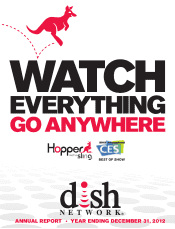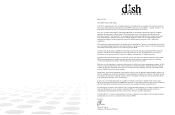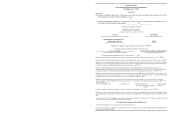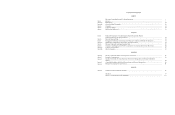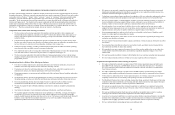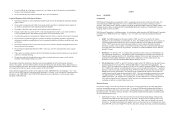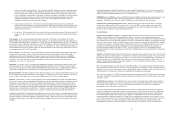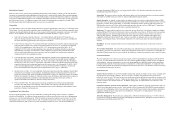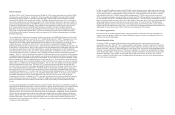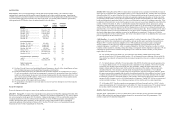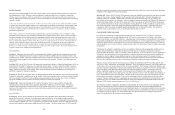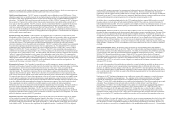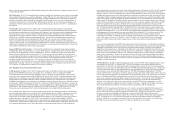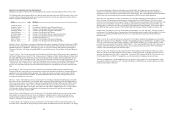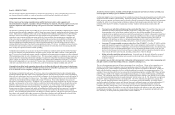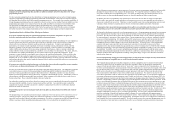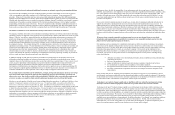Dish Network 2012 Annual Report Download - page 9
Download and view the complete annual report
Please find page 9 of the 2012 Dish Network annual report below. You can navigate through the pages in the report by either clicking on the pages listed below, or by using the keyword search tool below to find specific information within the annual report.6
6
Wireless Spectrum
On March 2, 2012, the FCC approved the transfer of 40 MHz of 2 GHz wireless spectrum licenses held by DBSD
North America and TerreStar to us. On March 9, 2012, we completed the DBSD Transaction and the TerreStar
Transaction, pursuant to which we acquired, among other things, certain satellite assets and wireless spectrum
licenses held by DBSD North America and TerreStar. In addition, during the fourth quarter 2011, we and Sprint
entered into a mutual release and settlement agreement (the “Sprint Settlement Agreement”) pursuant to which all
issues then being disputed relating to the DBSD Transaction and the TerreStar Transaction were resolved between
us and Sprint, including, but not limited to, issues relating to costs allegedly incurred by Sprint to relocate users
from the spectrum then licensed to DBSD North America and TerreStar. Pursuant to the Sprint Settlement
Agreement, we made a net payment of approximately $114 million to Sprint. The total consideration to acquire
these assets was approximately $2.860 billion. This amount includes $1.364 billion for the DBSD Transaction,
$1.382 billion for the TerreStar Transaction, and the net payment of $114 million to Sprint pursuant to the Sprint
Settlement Agreement.
Our consolidated FCC applications for approval of the license transfers from DBSD North America and TerreStar
were accompanied by requests for waiver of the FCC’s Mobile Satellite Service (“MSS”) “integrated service” and
spare satellite requirements and various technical provisions. The FCC denied our requests for waiver of the
integrated service and spare satellite requirements but did not initially act on our request for waiver of the various
technical provisions. On March 21, 2012, the FCC released a Notice of Proposed Rule Making (“NPRM”)
proposing the elimination of the integrated service, spare satellite and various technical requirements attached to the
2 GHz licenses. On December 11, 2012, the FCC approved rules that eliminated these requirements and gave notice
of its proposed modification of our 2 GHz authorizations to, among other things, allow us to offer single-mode
terrestrial terminals to customers who do not desire satellite functionality. On February 15, 2013, the FCC issued an
order, which will become effective on March 7, 2013, modifying our 2 GHz licenses to add terrestrial operating
authority. The FCC’s order of modification has imposed certain limitations on the use of a portion of this spectrum,
including interference protections for other spectrum users and power and emission limits that we presently believe
could render 5 MHz of our uplink spectrum effectively unusable for terrestrial services and limit our ability to fully
utilize the remaining 15 MHz of our uplink spectrum for terrestrial services. These limitations could, among other
things, impact the finalization of technical standards associated with our wireless business, and may have a material
adverse effect on our ability to commercialize these licenses. The new rules also mandate certain interim and final
build-out requirements for the licenses. By March 2017, we must provide terrestrial signal coverage and offer
terrestrial service to at least 40% of the aggregate population represented by all of the areas covered by the licenses
(the “2 GHz Interim Build-out Requirement”). By March 2020, we must provide terrestrial signal coverage and
offer terrestrial service to at least 70% of the population in each area covered by an individual license (the “2 GHz
Final Build-out Requirement”). If we fail to meet the 2 GHz Interim Build-out Requirement, the 2 GHz Final Build-
out Requirement will be accelerated by one year, from March 2020 to March 2019. If we fail to meet the 2 GHz
Final Build-out Requirement, our terrestrial authorization for each license area in which we fail to meet the
requirement will terminate. In addition, the FCC is currently considering rules for a spectrum band that is adjacent
to our 2 GHz licenses, known as the “H Block.” If the FCC adopts rules for the H block that do not adequately
protect our 2 GHz licenses, there could be a material adverse effect on our ability to commercialize the 2 GHz
licenses.
As a result of the completion of the DBSD Transaction and the TerreStar Transaction, we will likely be required to
make significant additional investments or partner with others to, among other things, finance the commercialization
and build-out requirements of these licenses and our integration efforts including compliance with regulations
applicable to the acquired licenses. Depending on the nature and scope of such commercialization, build-out, and
integration efforts, any such investment or partnership could vary significantly. Additionally, recent consolidation
in the wireless telecommunications industry, may, among other things, limit our available options, including our
ability to partner with others. There can be no assurance that we will be able to develop and implement a business
model that will realize a return on these spectrum licenses or that we will be able to profitably deploy the assets
represented by these spectrum licenses, which may affect the carrying value of these assets and our future financial
condition or results of operations.
7
7
In 2008, we paid $712 million to acquire certain 700 MHz wireless spectrum licenses, which were granted to us by
the FCC in February 2009. These licenses mandate certain interim and final build-out requirements. By June 2013,
we must provide signal coverage and offer service to at least 35% of the geographic area in each area covered by
each individual license (the “700 MHz Interim Build-out Requirement”). By the end of our license term (June
2019), we must provide signal coverage and offer service to at least 70% of the geographic area in each area covered
by each individual license (the “700 MHz Final Build-out Requirement”). We have recently notified the FCC of our
plans to commence signal coverage in select cities within certain of these areas, but we have not yet developed plans
for providing signal coverage and offering service in all of these areas. If we fail to meet the 700 MHz Interim
Build-out Requirement, the term of our licenses will be reduced, from June 2019 to June 2017, and we could face
possible fines and the reduction of license area(s). If we fail to meet the 700 MHz Final Build-out Requirement, our
authorization for each license area in which we fail to meet the requirement will terminate.
New Business Opportunities
From time to time we evaluate opportunities for strategic investments or acquisitions that may complement our
current services and products, enhance our technical capabilities, improve or sustain our competitive position, or
otherwise offer growth opportunities.
Relationship with EchoStar
On January 1, 2008, we completed the distribution of our technology and set-top box business and certain
infrastructure assets (the “Spin-off”) into a separate publicly-traded company, EchoStar Corporation (“EchoStar”).
DISH Network and EchoStar operate as separate publicly-traded companies, and neither entity has any ownership
interest in the other. However, a substantial majority of the voting power of the shares of both DISH Network and
EchoStar is owned beneficially by Charles W. Ergen, our Chairman, or by certain trusts established by Mr. Ergen
for the benefit of his family. EchoStar is our sole supplier of digital set-top boxes and digital broadcast operations.
In addition, EchoStar is a key supplier of transponder capacity and related services to us. See “Item 1A. Risk
Factors” and Note 20 in the Notes to our Consolidated Financial Statements in Item 15 of this Annual Report on
Form 10-K for more information.

